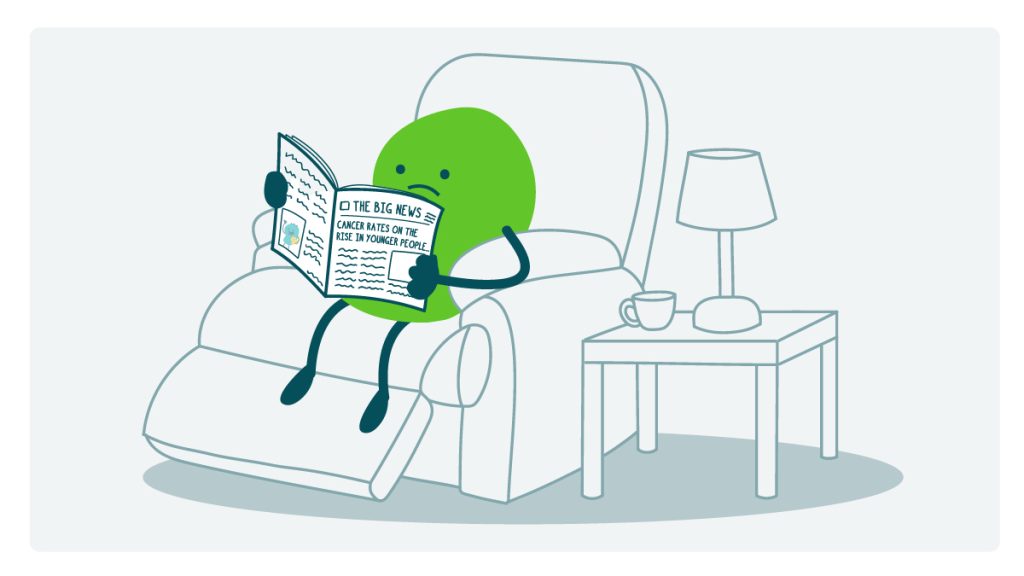
Here at We ❤️ Health Literacy HQ, we like to keep a close eye on trends in the health world. And one such trend has us a bit concerned: the rising cancer rates in young(er) people.
Generally speaking, the risk of cancer goes up with age. Of course that’s hasn’t changed — but experts are warning about rising rates of “early-onset” cancer, or cancer in people ages 18 to 49. Researchers aren’t sure what’s behind this trend, but we do know this: Colorectal cancer is now the leading cause of cancer death in men younger than 50, and the second-leading cause of death for women in that age group. Rates of early-onset breast, prostate, and endometrial cancers are also increasing.
Of course this is problematic for lots of reasons, including the fact that most people don’t start getting routine cancer screenings until they’re older. The U.S. Preventive Services Task Force (USPSTF) — the org that makes evidence-based recommendations for preventive services — recently lowered the age for breast cancer screening to 40 years. And in 2021, it lowered the age for colorectal cancer screening to 45. But that might not be enough.
One reason the USPSTF’s recommendations are so important is that health insurance companies may not cover routine cancer screening for people who haven’t yet reached the recommended screening age, or who don’t meet other risk factors as defined by the recs. In addition, some health care providers may not order cancer screenings for patients who don’t meet specific criteria — or they may not even start a conversation about screening with younger patients.
So what can health communicators do? We’ve got some tips:
- Raise awareness about the power of cancer screenings! Use your health communication outlets and materials to educate people about the importance of screenings to help find cancer early — when it’s usually easier to treat. And this doesn’t have to be only in the context of cancer-related communications. You can share info about cancer screenings along with tips for other preventive, err, healthy habits — like getting plenty of physical activity and staying up to date on vaccines.
- Note that people can get cancer at any age. It’s not very uplifting — but if you’re writing specifically about cancer, include the fact that even young and healthy people can and do get cancer. Experts warn that early-onset cancers are often diagnosed later due to the lack of routine screening (see above!) — and also because some young people may not consider the possibility that cancer could happen to them. So they put off seeing a doctor, even if they notice unusual symptoms.
- Educate about cancer symptoms. If you’re writing about cancer prevention and detection, don’t forget to mention early warning signs and symptoms. And while those vary for different cancers, one thing’s true for all of them: If people notice anything out of the ordinary, it’s best to get it checked out.
- Encourage conversations about family history. One important factor in predicting cancer risk in younger people is family history. So encourage people to talk with their family members about any cancers or other health problems in close relatives — and to share that information with their doctor.
- Empower people to take charge of their health. Emphasize to readers that they’re the experts when it comes to their bodies — and if something doesn’t feel right, or if they’re concerned about their family health history, they deserve to be taken seriously. Even if that means getting a second opinion from another health care provider.
The bottom line: Cancer rates are on the rise in young people. As health communicators, we can help by educating our audiences about the risks and empowering them to take steps to protect themselves.
Copy/paste to share on social (and tag us!): #Cancer rates are on the rise among young people. As #HealthComm professionals, there are things we can do to help, says CommunicateHealth. Check out these tips: https://bit.ly/3U9SWmJ #HealthLiteracy
Browse recent posts